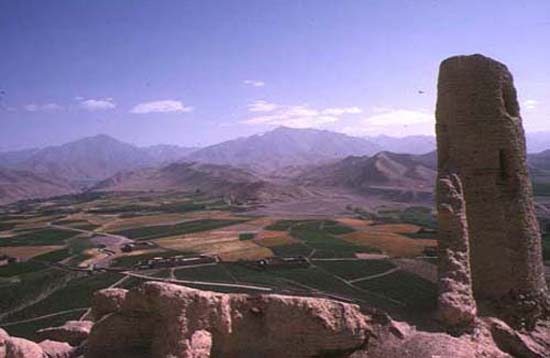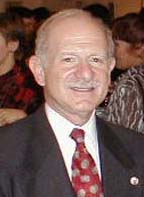December 4, 2003 - Washington Times: Colombia in Kabul By Former Director Mark L. Schneider
Peace Corps Online:
Peace Corps News:
Headlines:
Peace Corps Headlines - 2003:
December 2003 Peace Corps Headlines:
December 4, 2003 - Washington Times: Colombia in Kabul By Former Director Mark L. Schneider
Colombia in Kabul By Former Director Mark L. Schneider

Read and comment on this op-ed from the Washington Times by former Peace Corps Director Mark L. Schneider that says that the drug trade could undermine the nascent international effort to help Afghanistan build a democracy after 23 years of devastating war and turn Afghanistan into another Colombia:"...nearly two years after Bonn, Afghanistan faces more rather than fewer attacks from al Qaeda and Taliban forces operating from across a forbidding mountain border. Pakistan appears to be taking out "insurance" against the west abandoning the country again and against perceived anti-Islamabad factions in Kabul by permitting Taliban recruiting, arming and attack planning without much interference. The Pakistan government cannot receive $3 billion in U.S. aid and allow Taliban forces and Taliban leaders to operate almost freely."
Unless adequate numbers and the right categories of troops, arms and rules of engagement are made available, Afghanistan will fail and a corrupt narco-state, once again a base for terrorism, could be the end result. Read the op-ed at:
Colombia in Kabul*
* This link was active on the date it was posted. PCOL is not responsible for broken links which may have changed.
Colombia in Kabul
By Mark L. Schneider
Published December 4, 2003
Colombia produces nearly 80 percent of the cocaine consumed in the United States. This year, Afghanistan will produce 80 percent of the heroin consumed within Europe. Without something of a miracle, the drug trade could undermine the nascent international effort to help Afghanistan build a democracy after 23 years of devastating war.
In early November, traveling in Afghanistan, the smell, feel and magnitude of the drug threat evokes Colombia. We are increasingly seeing both government-affiliated militias and armed insurgent groups in Afghanistan become reliant on poppy; just as every guerrilla and paramilitary group in Colombia descended into financial dependence upon the cocaine trade. A security vacuum in the countryside gave illegal military forces free reign at a time when the central government had abandoned rural Colombia and offered little opportunity for economic development.
Similarly, insecurity in rural Afghanistan today is rising as resurgent Taliban and al Qaeda forces carry out hit-and-run terror attacks from bases in Pakistan as well as redoubts in Afghanistan. Poppy production is believed to finance some of the opposition forces operating from within Afghanistan. Some Afghan officials and commanders are also enmeshed in the drug trade. Effective law enforcement is virtually nonexistent. At present, the coalition military forces of Operation Enduring Freedom (OEF) don't have policing the drug trade in their mandate, and there are only a few token programs aimed at alternative economic development
The U.N. Office of Drugs and Crime estimates that the Afghan annual harvest of opium poppies brings $1.2 billion to the farmers and a near equal amount to everyone else who processes, protects and transports the drug. Opium cultivation and trafficking equals half the country's under-$5 billion GNP. When farm workers earn $12 per day harvesting poppy and $3 to $4 per day harvesting wheat, guess which option they choose? Militia commanders and narcotics entrepreneurs are also not beyond threatening farmers who don't plant poppy.
Without legitimate security forces available in the poppy-growing areas, it is almost impossible for an alternative rural strategy to succeed. It also is hard to imagine the political transition succeeding with drug money available to corrupt the process. Regional factions all have to feel a threat if they continue to invest in drugs. And while the building of an Afghan national army and a professional police force are worthy and essential objectives, effective back-up force for the next several years, at least, will depend on international troops. That international security presence also is essential to the country's political future. It is crucial to the Constitutional Loya Jirga planned for December, and for free and fair presidential and parliamentary elections down the road.
Yet, nearly two years after Bonn, Afghanistan faces more rather than fewer attacks from al Qaeda and Taliban forces operating from across a forbidding mountain border. Pakistan appears to be taking out "insurance" against the west abandoning the country again and against perceived anti-Islamabad factions in Kabul by permitting Taliban recruiting, arming and attack planning without much interference. The Pakistan government cannot receive $3 billion in U.S. aid and allow Taliban forces and Taliban leaders to operate almost freely.
The good news for Afghanistan is that the Bush administration finally accepted pleas -- some 18 months after Bonn -- from Karzai, the United Nations and NGOs, including the International Crisis Group, to expand the International Security Assistance Force (ISAF) outside Kabul. ISAF has had some 5,700 troops in Kabul under multinational command and NATO took up the ISAF mantle in August. Last month, the U.N. Security Council approved a resolution authorizing NATO to extend its forces beyond the capital city.
The NATO-led ISAF will provide a bridge to the time the Afghanistan police and military can offer security on their own and will be major support in building those Afghan forces. In the short term, the NATO commanders recognize the need to construct a nationwide security umbrella that can help accelerate reconstruction, political transition and counternarcotics activities. They believe it will take at least double and probably triple the current ISAF force, including three quick reaction battalions and at least one civil/military unit in each province. Only an international military force in the short term could back up a threat to arrest warlords managing the poppy business.
The combined NATO and OEF forces could offer an overwhelming backup to Afghan counterdrug law enforcement forces. It might actually make a supply-side solution possible for poppy growers--allowing NGOs and civilian agencies to help Afghans build a new rural infrastructure and support alternative income generation.
Now, the bad news. No one is volunteering to provide the needed soldiers. Norway had promised 200 soldiers and it was reported that Canada, Holland and Sweden might be willing to provide some additional troops as well. But no one wants to be first in line. The political leaders of the NATO member countries have to be told that NATO, in its first real out-of-area peacekeeping enterprise, is being tested.
Given that most of Afghanistan's heroin is headed for European streets, pursuing greater military contingents from European countries within NATO seems highly justifiable. And unless adequate numbers and the right categories of troops, arms and rules of engagement are made available, NATO will fail. So will Afghanistan. And a corrupt narco-state, once again a base for terrorism, could be the end result.
About the Author

Mark L. Schneider is the senior vice president of the International Crisis Group and was Director of the Peace Corps from 2000 to 2001.
Copyright © 2003 News World Communications, Inc. All rights reserved.

Some postings on Peace Corps Online are provided to the individual members of this group without permission of the copyright owner for the non-profit purposes of criticism, comment, education, scholarship, and research under the "Fair Use" provisions of U.S. Government copyright laws and they may not be distributed further without permission of the copyright owner. Peace Corps Online does not vouch for the accuracy of the content of the postings, which is the sole responsibility of the copyright holder.
This story has been posted in the following forums: : Headlines; COS - Afghanistan; Speaking Out; Peace Corps Directors - Schneider
PCOL8780
34
.
|
By bankass.com (0-1pool136-38.nas12.somerville1.ma.us.da.qwest.net - 63.159.136.38) on Saturday, December 06, 2003 - 9:52 am: Edit Post |
You lament about not having volunteers join as soldiers. People aren't going to volunteer their lives away for a limited purpose. You see Mark, the purpose is not to go find the group or individual who terrorized our country. Remember we pulled out of their during another war. However, now we need that pipe line, vital minerals and cheap labor to get it in the national security.
You know alot of people volunteered for you who were abused by the Peace Corps system and were victims of violence and were killed or missing.
You were arrogant in your beliefs of having volunteers serve together.
Now as a military analyst and cheerleader, Will you send eight to twnety year olds into the border area with Pakistan "alone" and say "go get him".
Your comments will never provide me with any insight until you apologize for covering up safety and security cliches at Peace Corps. You made mistakes and didn't listen. By not listening to the right people who went through these horrible situations, you disserved us. Look at Senator Kerry, he did not listen either and look at what is happening to him. DLC dems are a thing of the dwindling past and we appreciate all your cheap talk.
When you apologize to us, then we will listen to you in the future.



